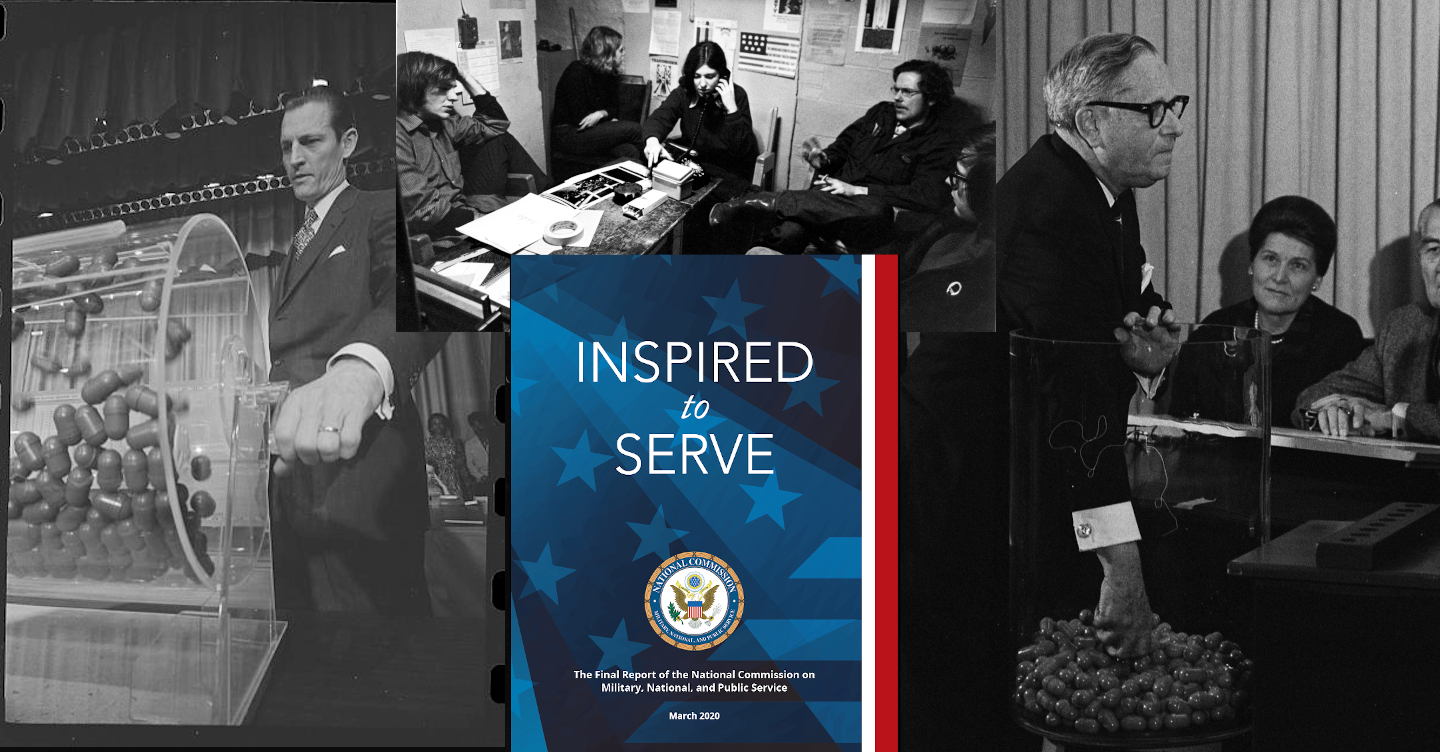
Martial Citizenship…is the concept that since soldiers serve the state the state therefore owes something back.
The National Commission on Military, National, and Public Service released its report “Inspired to Serve” on 25 March 2020. The Commission’s two primary statutory charges were: (1) to “conduct a review of the military selective service process” and (2) to “consider methods to increase participation in military, national, and public service in order to address national security and other public service needs of the Nation.” In concert with this release A BETTER PEACE welcomes Amy Rutenberg to the studio to discuss how the Vietnam-era draft affected society and how the U.S. transitioned to the all volunteer force. She joins our Editor-In-Chief Jacqueline Whitt to examine the unintended consequences and discriminations of draft policy, deferments and the evolution of what she calls the martial citizen.
Podcast: Download
“Inspired to Serve” Final Report
“Inspired to Serve” Executive Summary
Amy Rutenberg is an Assistant Professor at Iowa State University. She researches the connections among war, U.S. society, citizenship, and gender. Jacqueline E. Whitt is an Associate Professor of Strategy at the U.S. Army War College and the Editor-in-Chief of WAR ROOM. The views expressed in this presentation are those of the speakers and do not necessarily reflect those of the U.S. Army War College, U.S. Army, or Department of Defense.
Photo Description: (L) Curtis W. Tarr, director of the Selective Service System, turns the drum containing capsules of draft numbers at the annual draft lottery, 1972 (Top Center) Draft-age Americans being counseled by Mark Satin (far left) at the Anti-Draft Programme office on Spadina Avenue in Toronto, August 1967. (R) Congressman Alexander Pirnie (R-NY) drawing the first capsule for the Selective Service draft, Dec 1, 1969. (Bottom Center) Front cover of the 25 Mar 2020 report released by The National Commission on Military, National, and Public Service.
Photo Credit: (L) Library of Congress, Thomas J. O’Halloran, (TopCenter) Laura Jones and Bennett Jones Phillips, (R) Selective Service System, (Bottom Center) The National Commission on Military, National, and Public Service





This was a great podcast and the report will be interesting to read. As we can clearly see with our national response to COVID-19 American’s now lack a sense of national unity, pride, and commonality. Our young people seem to think that they are free to do anything, that they do not have to respect the instructions of governors and doctors, and that confusion will lead to so many meaningless deaths. Perhaps it is time to think about what we owe to America, and not what we are entitled to as Americans. This is the first call to national service in the life time of young people between the ages of 19 and 55, what will that response be like? Time will tell. Thanks for such a meaningful and timely discussion.
https://smallwarsjournal.com/jrnl/art/dulce-bellum-inexpertis-war-sweet-those-who-have-never-experienced-it
Dulce bellum inexpertis – “War is Sweet to Those Who Have Never Experienced It”
W. R. Baker
While March 29th is National Vietnam War Veterans Day, the “official” federal remembrance day (August 18th in Australia and New Zealand), each of us who went to war will probably remember not only the date we left the United States and the date we returned, but also certain events in-between that occurred in the land which President Reagan called “…100 rice paddies and jungles in a place called Vietnam.”
The individual Vietnam remembrance day might be the day you were first fired upon (perhaps shelled, mortared, or shot at) or the day wounded – occurring with those who became your closest family, who you relied upon each day, just as they did you. War has a way of throwing the best and the worst things at you all at once and Vietnam certainly proved that.
One of the most important remnants of the Vietnam War seems to be how it is still popularly reported by historians who mostly never had a stake in the game. The repetitive nature of their books and articles continue to remain distorted, inaccurate, and often just plain wrong, no matter how often they repeat each other.
The Draft was a fact of life for young men, however as much it may upset many today. Boys were taught such things as to hold doors open for women and, yes, to protect them from harm – that was how boys were raised by parents who were raised that way too – no apologies. Having a Draft Card was also a rite of passage, as well. Despite the cowards who fled, the protesting students, and college professors who egged them on, most young men answered The Call. This was because we were also raised by our WWII parents to take up the obligation to our country first – which many people unfortunately snicker at today.
The much-maligned Domino Theory also proved accurate from the onset. New Zealand, Australia, South Korea, Taiwan, Thailand, the Philippines, and the countries in the region had already faced (or were about to become challenged by) communists attempting to gain control of their countries – all united to prevent North Vietnam’s dominance of Southeast Asia and the obvious threat that communism posed to their countries. Many also showed their support of the American effort by deploying troops into South Vietnam, as well.
Rarely mentioned is that a treaty of neutrality on Laos was signed by North and South Vietnam (et al) in July 1962. Not surprisingly, North Vietnam ignored their written promise from the onset. During the War, the North positioned divisions in both Cambodia and Laos. Their forces would often strike into South Vietnam and run back across the border afterward, which we were forbidden to cross, even if we were in contact or hot pursuit.
History of the Vietnam War has also been hijacked by such people as socialist/communist Howard Zinn with his far-left version of American “History.” It is absurd and includes, of course, a section on Vietnam which many historians and school curriculums have embraced and feel determined to accept and teach. Of course, there is no mention of Zinn going to Hanoi at least twice during the war.
South Vietnam ultimately fell to the communists because academia, the press, and the politicians failed to continue sponsoring this budding democracy. When you are commanded to fight with one hand behind your back, the outcome is predictable. The aftereffects of our abandonment of South Vietnam were almost immediate: re-education camps where 185,000 died, 65,000 were executed outside of the camps, and 2 million refugees fled (and the 250,000 who died on the ocean) trying to escape the communist regime.
It’s interesting to note that, as Vietnam veterans get older, historians (particularly those who never served) have accepted these slanted “changes” in American history put forward by collapsing education systems without many moral or ethical values. They are quick to question the memories of those who were raised differently and are still alive to impart how things really were during the Vietnam War – not the omissions and biased interpretations that the repetition of academia, the self-important press, and the politicians are so keen to present as fact. It is bizarre that our military schools preach this impotent type of history because they should know better.
We can be proud of what we tried to do in Vietnam – though the fictional three-headed Hydra still guards a greatly distorted brand of “truth,” which some veterans groups and individuals seem to have also succumbed to.
This is our dilemma, but not the same one that the countries (and Montagnards) of Southeast Asia had to endure due to Hanoi’s unbridled militaristic expansion and subjugation of their own people after we left. You can ignore these facts and say it’s not our fault that millions more were killed – no matter how many times you might repeat it, it will also never be true.